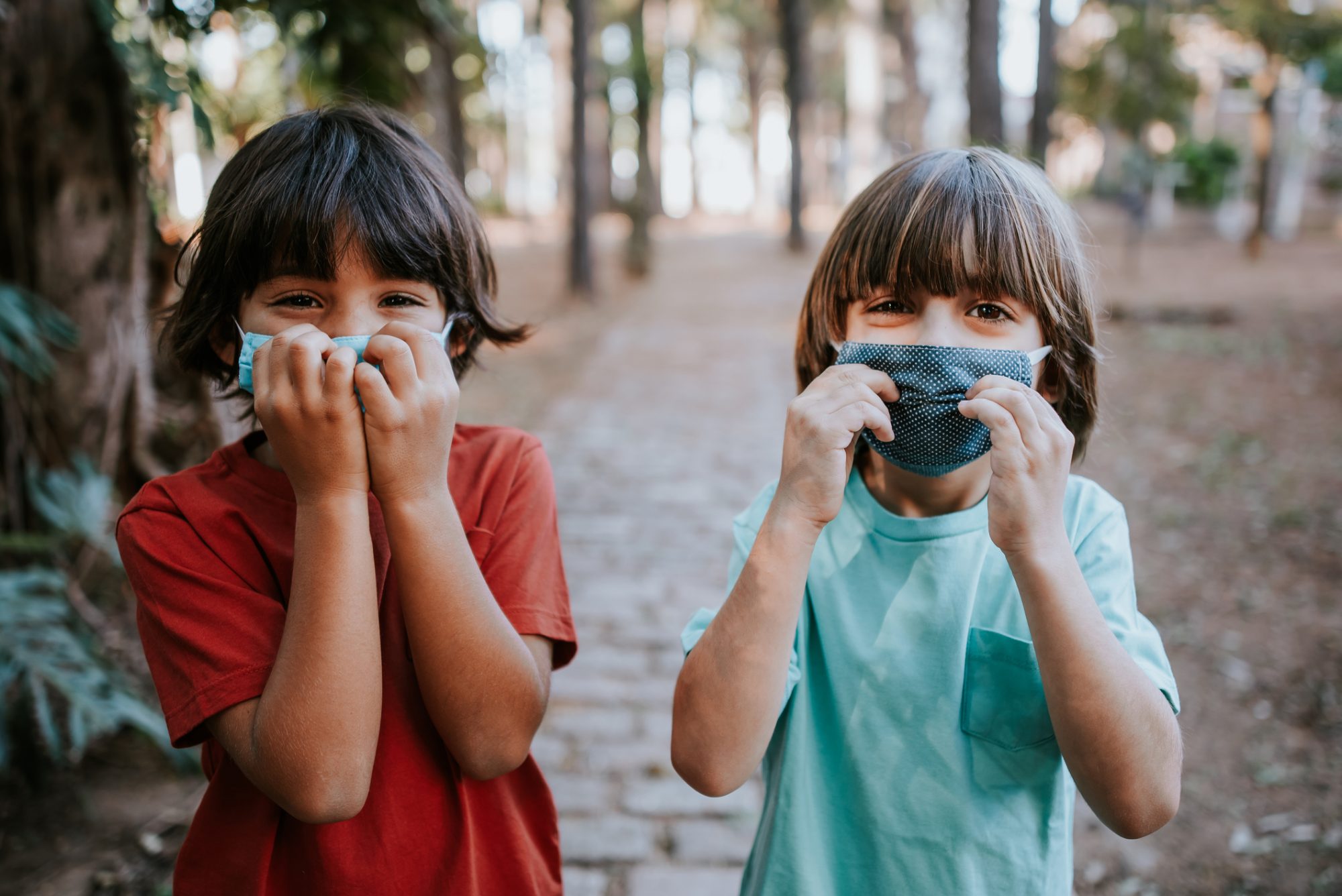In March 2020, life we knew it changed dramatically. The COVID-19 pandemic swept the country, shuttering schools and businesses alike, and forcing us into the confines of our homes for many months. Now, thanks to widely available vaccines and well-established masking guidelines, there's finally an end to the pandemic in sight. As such, many people have started reflecting on the effects of the pandemic, both positive and negative.

Are there silver linings to the disruption in our routines that we've all suffered over the past year and a half? We spoke with two physicians who both wholeheartedly feel that yes, some positive things have emerged from this challenging time. Keep reading for 10 things parents can feel good about while raising kids during the COVID-19 pandemic.
1. More Family Time
If there's one gift we've all received from living through a pandemic, it's the gift of time. With everything from ballet lessons to business trips put on hold, American families found themselves with a great deal of time on their hands.
"In general, for some families (who have not had major health or financial losses), working from home and not commuting has translated to more family time, for both mothers and fathers," says Kimberly Sirl, Ph.D., a Washington University pediatric psychologist at St. Louis Children's Hospital. "A major theme I keep seeing is that the pandemic has shaken up routines and parents have become (through necessity) more mindful about their values and needs of their families and more creative about meeting these needs."
2. New Family Traditions
During the pandemic, many families chose to focus on the positive rather than what was suddenly lacking in their lives, and they instituted new family traditions that they hope to keep. Baking was a popular activity (remember that crazy yeast shortage?), as was family game night.
Tara Neumayr, M.D., a Washington University critical care pediatrician at St. Louis Children's Hospital, shares her personal perspective. She says, "When every day seems more or less the same, small special events can add a lot to family life. We continue to do board game nights and pizza Fridays. I can't wait to bake cookies for Santa with my kids again next year."
3. Increased Focus on Mental Health
In a report entitled "Mental Health by the Numbers," the National Alliance on Mental Illness reports that 16.5 percent of youth ages 6 to 17 experience a mental health disorder. But as the pandemic dragged on for months on end, many people who had not previously suffered from mental health challenges began to see the effects. An article published in the Wiley Public Health Emergency Collection states, "the restrictive measures [imposed by the lockdown] undoubtedly have affected the social and mental health of individuals from across the board."
The silver lining of all this is the destigmatization of mental health as a whole. "Insurance companies are continuing to reimburse telehealth," says Dr. Neumayr. "That has helped to make mental health care, especially highly specialized care (like pain management), more accessible to rural families and families with transportation difficulties. People are even doing telehealth from their cars or private rooms at their child's school, so in that way there is less stigma and more accessibility."
4. Greater Self-Sufficiency and Better Problem Solving
As kids were home day after day (after day) during the pandemic, many eventually began to adapt by filling gaps in their busy schedules with creative and imaginative play. "The ability to occupy one's unstructured time productively is associated with positive character development, problem solving, and protection against mood disorders such as anxiety and depression," says Dr. Neumayr.
5. Better Technology Skills
"You're muted." "You're not presenting." "You have a bad connection." These were common phrases uttered by our kids' little mouths while engaging in virtual learning during the pandemic. While parents were surprised by how quickly their kids adapted to the demands placed on them, it was perhaps most apparent in the use of technology.
6. Better Distance Education Offerings
The pandemic has reshaped the way education is handled in the U.S. Sure, we may have seen the end of extended snow days. But the flip-side is the vast majority of school systems across the country now have a plan in case virtual learning needs to occur in the future. This can keep people safe in bad weather and create an acceptable alternative for future quarantines or illnesses.
7. Improved Sibling Bonds
With no one else to play with, siblings especially noticed a silver lining of the pandemic: "After being isolated from their friends and activities with kids their own ages for months, kids with siblings learned to rely on each other as playmates and allies, even despite age differences," says Dr. Neumayr.
8. Greater Sense of Community and Wider Perspective
An otherwise dark time in American history, the COVID-19 pandemic was marked by kindness and altruism as well. We checked in on elderly, home-bound neighbors with encouraging signs and bags of groceries. We sewed masks for one another, and we made plastic face shields for teachers and frontline workers. These acts of kindness likely didn't go unnoticed by our children, who will hopefully carry these lessons with them as they grow.
"Kids have absorbed a tangible lesson about how connected we all are, about individual responsibility for shared goals, and the reality that reaching an important goal may be worth some measure of pain," says Dr. Neumayr.
9. Practical Understanding of Germs and Healthy Habits
No discussion of the pandemic is complete without talking about the biggest takeaway from all this: germs! As a result of living through a pandemic, "even the youngest kids can now understand that washing your hands, covering your cough, and staying home when you're sick can help prevent spreading illnesses. That knowledge is vital for this pandemic, but will also be important for keeping them and the people around them healthy in the midst of normal cold and flu seasons," Dr. Neumayr says.
10. Better Stress-Management Skills
As illness washed over us at an alarming pace, kids were exposed to news headlines that seemed like a nightmare come true. And while parents were rightly concerned about how this would affect their kids, it presented an opportunity to talk with them about "big things" and to provide them with tools for handling the feelings they experienced. These stress-management techniques are likely to make today's kids stronger and more resilient once the pandemic subsides.





